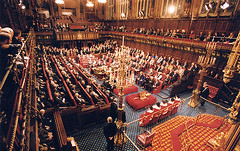Nobility in an independent Scotland

However, a separate question is what will happen to the Scottish peers, both the hereditary ones and the life peers.
In general, republics tend to abolish all hereditary titles, and most monarchies tend to preserve the peerage. However, the Kingdom of Norway got rid of their nobility after independence, so there would be a precedent for abolishing it completely. However, my gut feeling is that this will have to wait until the Republic of Scotland is declared.
The life peers, on the other hand, are a unique UK invention (and a rather recent one, too), which basically came about because the House of Lords didn’t get replaced with something more democratic ages ago.
The main reason for making somebody a life peer is to allow them to sit in the House of Lords, so unless an independent Scotland creates a Hoose o Lairds — which I consider extremely improbable — their entire raison d’être disappears.
It therefore seems very unlikely that Scotland will be granting life peerages after independence.
However, what will happen to the UK’s current life peers from Scotland? This is not Scotland’s problem, of course, and I guess the rUK will have to make a decision on this in due course. The most likely scenario is that they’ll lose their seats, however, so I’m not surprised that many of the current Scottish life peers are fighting tooth and nail to preserve the union.